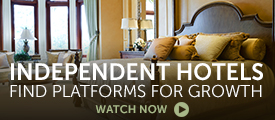In a survey by the National Association of Colleges and Employers, 77.8% of employers named both “leadership” and “the ability to work in a team structure” as key attributes they look for on a job application. According to a study by LinkedIn, more than half of the people surveyed feel more comfortable voicing their opinion at work now than when they first started their career.
Building confidence is an important part of career development. In these videos successful hospitality professionals discuss leadership and taking charge of your own career:
Leadership skills can be developed within a supportive working environment. A report by DDI found that 70 % of leaders say developmental assignments are most effective way to develop leadership. The Global Leadership Forecast 2014/2015 also suggests that not having enough time or opportunity holds people back from growing as a leader.
But attitudes to work are changing, people are building their own paths to success. In the LinkedIn New Norms @Work study a third of people said that if they were unhappy, leaving within a month would be ok. Interestingly the survey also found that the number of jobs professionals think looks good on a LinkedIn profile is 3. An unrelated survey from RecruitFi also looked in to attitudes around multiple jobs. This Millennial Outlook Survey found that 83% of millennials would change jobs to pursue their passions, even while acknowledging that it could look bad to prospective employers.
When people do decide to change their careers, according to a survey by Accountemps, two in five executives in the United States would turn to a spouse or significant other for advice first, with friends and mentors being turned to by 20% and 21% of people respectively.
Those starting a career may not have the confidence or experience to lay out a plan for their career, and may feel uncertainty about job prospects and security. Therefor opportunities to gain skills and step into an industry are appreciated. According to the Milkround Student and Graduate Career Confidence Survey Report 2015, 61.2% of student and graduates felt that “work experience or an internship” would make them feel more confident about their career prospects.
If you’ve been sent to this page and you’re not yet on the circulation list to receive these regular briefings and you would like to sign up, you can do see here. It’s free.
Video clips produced by ybc.tv for the Hospitality Channel, including interview from industry conferences such as the IHIF conference as well as specific Hospitality Channel shoots.




